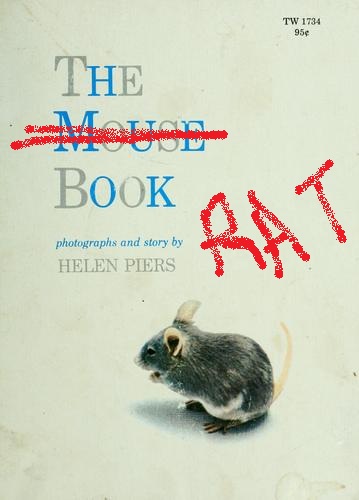
Welcome to the return of the Book Rat Project, the sustained experiment in which a book critic (me) attempts to act as a human algorithm for a willing subject (my Phoenix colleague Will Delman). This week, my poor subject tried and failed to read Almost Never by Daniel Sada, a book blurbed by no less than Roberto Bolano, who calls him the most daring writer of his generation. Well, that's not exactly how Will felt about it. Read on:
---------

I really, really wanted to like Almost Never by Daniel Sada. It works in
so many ways. It's an interesting period piece about a country that gets largely
ignored in the universe of WWII literature. It's also an intelligent and
graceful interrogation of 1940s Mexico. Most of all, it's an
unusually self-aware character-study for its era, both psychologically and
stylistically.
On occasion, it even manages to be
funny.
Despite all of this, Almost Never felt like a failure to me. I
understand it was originally written in the 1940s. The sexual politics of the
world were arguably more reactionary than they are now, but this is still,
basically, the story of a man who actively destroys one woman after another with
an almost sociopathic disregard for the consequences of his actions, only to be
rewarded by his author time after time.
Almost Never is
the story of Demetrio Sordo, a man that decides to alleviate his boredom with
his life by becoming a connoisseur of prostitutes. Before long Sordo thinks he's
fallen in love with one prostitute in particular, but that only lasts until she
tells him she's pregnant. By then they're already on the run from her madam,
half-way to Mexico
City.
At this revelation Demetrio abandons his former love on
the train after feeding her some sleeping pills-leaving her with nothing but a
small roll of bills and, we can assume, a massive drug-induced hangover-secure
in his knowledge that she'll undoubtedly find work as a prostitute in whatever
town she wakes up in, assuming she can find a doctor to sort out her "problem".
Thus Demetrio sets off in search of other
interests.
And so it goes.
Did I mention that Demetrio, even before abandoning his
first great love, is also trying to seduce a hopelessly naïve Catholic girl, and
his own aunt? Or that he nearly disowns his mother? I've read a few reviews that
have really tried to focus on the "humor" of this book, in the sense that
Demetrio suffers hardships and difficulties, but they all seem to miss the
overwhelming sympathy Sada shows his protagonist again and again and again.
Basically, I don't buy the apologies.
From a classic, academic, liberal-arts perspective I
know I'm judging this book on the wrong criteria. To be perfectly honest: the
sentences are fantastic; the landscapes are beautifully rendered in beautiful
prose; the characters always feel believably hefty, even when coming across as
psychologically shallow. In many, many ways this is an undeniably strong work of
fiction.
And yet . . .Almost
Never perpetually failed to engage me to the point that I was forced,
finally, after two hard-fought weeks, to abandon its scrambling jokes and
brutalities. Ultimately, I wasn't able to overcome this basic fact: I didn't
care what happened to Demetrio Sado.
What ever finally happened to him I couldn't imagine it
making up for the moment when he abandoned his love on the
train.
The Book Rat Letter Grade: N/A
----------------
So much for that! (For contrast, check out Rachel Nolan's review in the Times.) As a reward for his troubles, I've assigned Will The Great Night by Chris Adrian, just out in paperback. I loved it -- hope he does too. Hey Will, don't read my review before you finish yous, kay?
















